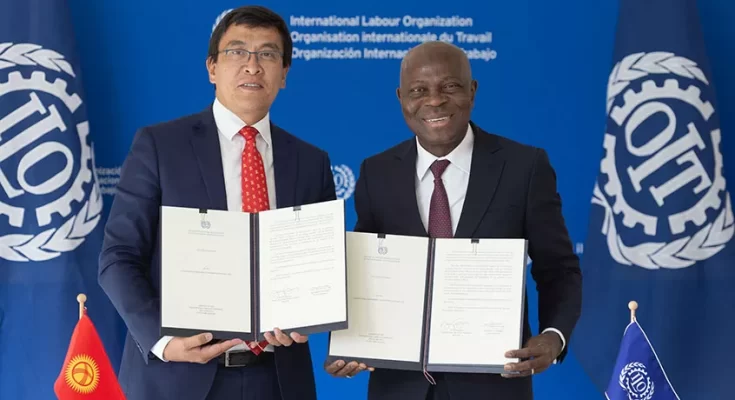GENEVA (ILO News) – On 3 June 2024, the Government of Kyrgyzstan deposited the instrument of ratification for the Violence and Harassment Convention, 2019 (No. 190) with the Director-General of the ILO, Mr. Gilbert Houngbo, making Kyrgyzstan the 41st country to ratify this convention.
At the ratification ceremony held at the ILO headquarters, the Vice Prime Minister of Kyrgyzstan, Mr. Edil Baisalov stated: “Today marks a significant milestone for the Kyrgyz Republic as we deposit the instrument of ratification for the International Labour Organization’s Violence and Harassment Convention, 2019 (C. 190). This momentous occasion reflects our nation’s unwavering commitment to promoting a safe, respectful, and dignified working environment for all, with a particular focus on the protection and empowerment of our esteemed women.”
Mr. Houngbo noted that “The primary goal of the International Labour Organization (ILO) is to promote opportunities for women and men to obtain decent and productive work, in conditions of freedom, equity, security and human dignity. Kyrgyzstan’s ratification signifies a significant step towards a world of work devoid of violence and harassment, underpinned by the core values of dignity, equality, and respect for all individuals. This action reinforces the promise that no one will be left behind. The ILO is excited to continue partnering with Kyrgyzstan in advancing this essential mission.”
The ILO Convention No. 190 affirms the fundamental right of individuals to a workplace free from violence and harassment. It is the first international labour standard to comprehensively address violence and harassment in the world of work. Together with Recommendation No. 206, it establishes a framework for action, fostering a future of work grounded in dignity and respect.
The ILO has supported Kyrgyzstan’s ratification process of the Violence and Harassment Convention through capacity-building for workers’ organizations, advocacy activities, gap analysis, and technical and legal assistance for legislative reforms.
For additional information, please refer to NORMLEX.





